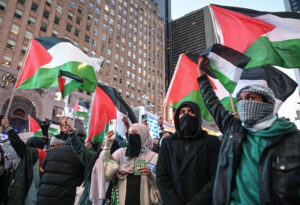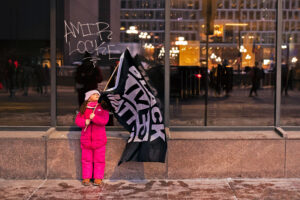Towards the end of Christopher Marlowe’s play Tamburlaine Part Two, our marauding anti-hero burns a copy of the Quran, along with other Islamic books, as a kind of audacious test. “Now, Mahomet,” he cries, “if thou have any power, come down thyself and work a miracle.” Two scenes later, he is dead.
We might see this as a cautionary tale for our times. After all, it isn’t only Turco-Mongol conquerors who find themselves punished for Quran-burning. Last week, the Danish parliament voted to ban the desecration of all religious texts following a spate of protests in which copies of the Qur’an had been destroyed. Inevitably, the new law has been couched as a safety measure. This burning of the book, claims justice minister Peter Hummelgaard, “harms Denmark and Danish interests, and risks harming the security of Danes abroad and here at home”.
He has a point. Even unconfirmed accusations of Quran-burning can be sufficient to prompt extremist violence. In 2015, being accused of defiling the holy book, Farkhunda Malikzada was beaten to death by a ferocious mob in Afghanistan while bystanders, including police officers, did nothing to intervene. Many filmed the brutal murder on their phones and the footage was widely shared on social media. In 2022, a mentally unstable man called Mushtaq Rajput was similarly accused and tied to a tree and stoned to death in Pakistan. Earlier this year in Iran, it was reported that Javad Rouhi was tortured so severely that he could no longer speak or walk. He was sentenced to death for apostasy and later died in prison under suspicious circumstances.
But while we might anticipate that the desecration of the Quran would be proscribed in Islamic theocracies, it is troubling to see similar laws being passed in secular nations such as Denmark. The government had not been so faint-hearted when faced with similar problems in 2005. After cartoons of the Prophet Mohammed were published in Jyllands-Posten, a global campaign from Indonesia to Bosnia demanded that the Danish authorities take action. The government stood firm and the judicial complaint against the newspaper was dismissed.
In a free society this is the only justifiable response, albeit one that takes considerable courage. And the climate of intimidation that has descended since is a product of our collective failure to defend freedom of speech against the demands of militants. When the Ayatollah Khomeini pronounced his fatwa on Salman Rushdie for his novel The Satanic Verses, one would have hoped for a unified front on behalf of one of our finest writers. Instead, much of the literary and political establishment abandoned or even censured him. In the Australian television show Hypotheticals, the singer Yusuf Islam, formerly known as Cat Stevens, implied that he would have no objections to Rushdie being burned alive.
That a work of fiction such as The Satanic Verses could not even be published today gives us some indication of the extent to which we have forsaken the principle of free speech. If we are so squeamish about the burning of Qurans, why were so many of us indifferent to the burning of Rushdie’s book on the streets of Bolton and Bradford? Yusuf Islam’s remark about the author’s immolation might have been flippant but, as Heinrich Heine famously wrote: “Where they burn books, they will in the end burn people too.”
The ceremonial burning of books in Germany and Austria in the Thirties has ensured that the act will always have a unique charge, and a disquieting, visceral effect. It is why, for instance, the most memorable scene in Mervyn Peake’s Titus Groan is when the villain Steerpike sets fire to his master’s library. It is a gesture designed to repudiate the very heights of human achievement, to hurl his victim into a spiral of despair. When Rushdie saw his own novel publicly incinerated, he confessed to feeling that “now the victory of the Enlightenment was looking temporary, reversible”.
The burning of the Quran leaves many of us similarly troubled. We do not need to approve of the contents to sense that the destruction of a book is symbolic of a desire to limit the scope of human thought. When activists post footage of themselves gleefully setting fire to copies of Harry Potter, one cannot shake the similar suspicion that they would happily substitute the books with the author herself.
But while many of us find the burning of books instinctively rebarbative, to outlaw this form of protest is essentially authoritarian. And to reinstate blasphemy laws by specifying that only religious books are to be protected is fundamentally retrograde. Of course, such laws already exist in most Western countries in an unwritten form. In March, a 14-year-old autistic boy was suspended from his school in Wakefield, reported to the police, and received death threats after he accidentally dropped a copy of the Quran on the floor, causing some of the pages to be scuffed. He may not have committed a crime, but many people behaved as though he had.
And the same unwritten laws are in force in the fact that few would be brave enough to publish cartoons of the Prophet Mohammed after the massacre at the offices of French satirical magazine Charlie Hebdo in 2015. Five years later, the schoolteacher Samuel Paty was beheaded on the streets of Paris simply for showing the offending images during a lesson on free speech. Closer to home, a teacher at Batley Grammar School in West Yorkshire is still in hiding after showing the images to his pupils and stirring the ire of a righteous mob.
The failure of the school’s headmaster, as well as the teaching unions, to support this man against the demands of religious fundamentalists is revealing. Why must those who claim to be defending the dignity of Muslims treat them as irascible children? At the same time, as Sam Harris recently pointed out, there is an oddity in the fact that so many Muslims do not appear to be alarmed that “their community is so uniquely combustible”.
The bitter reality is that terrorism works, particularly when so many governments across the Western world are seemingly willing to fritter away our bedrock of liberal values. This has been actuated, in part, by an alliance of two very different forms of authoritarianism: ultra-conservative Islamic dogma and the safetyist ideology of “wokeness”. The latter has always claimed that causing offence is a form of violence, and the former has been quick to adopt the same tactics. This is why protesters outside Batley Grammar School asserted that the display of offensive cartoons was a “safeguarding” issue, and the Muslim Council of Britain criticised the school for not maintaining an “inclusive space”. The same censorious instincts have been updated, and are now cloaked in a more modish language.
In a civilised and pluralistic society, the burning of a holy book might provoke a variety of responses — anger, disbelief, or just a shrug of the shoulders — but it should never lead to violence. Back when The Onion still had some bite, the website satirised this “unique combustibility” through the depiction of a graphic sexual foursome between Moses, Jesus, Ganesha and Buddha. The headline said it all: “No One Murdered Because Of This Image”.
Freedom of speech and expression still matters, and if that means a few hotheads and mini-Tamburlaines might burn their copies of the Quran then so be it. It is unfortunate that we have reached the point where Islam must be ring-fenced from ridicule or criticism, whether due to fear of violent repercussions or a misguided and patronising effort to promote social justice. But for this state of affairs we ultimately have only ourselves to blame, and in particular our tendency to capitulate to religious zealots when they seek exemption from the liberal consensus.
Disclaimer
Some of the posts we share are controversial and we do not necessarily agree with them in the whole extend. Sometimes we agree with the content or part of it but we do not agree with the narration or language. Nevertheless we find them somehow interesting, valuable and/or informative or we share them, because we strongly believe in freedom of speech, free press and journalism. We strongly encourage you to have a critical approach to all the content, do your own research and analysis to build your own opinion.
We would be glad to have your feedback.
Source: UnHerd Read the original article here: https://unherd.com/




